-
 Art of Wellness Acupuncture & Traditional Chinese Medicine (TCM)11704 Wilshire Blvd, Suite 295, Los Angeles, CA, 90025
Art of Wellness Acupuncture & Traditional Chinese Medicine (TCM)11704 Wilshire Blvd, Suite 295, Los Angeles, CA, 90025
myartofwellness@gmail.com310-451-5522 Office Hours
MonClosedTue7:30 am --4 pmWed7:30 am --4 pmThu7:30 am -- 4 pmFri7:30 am -- 4 pmSat7:30 am -- 4 pmSunClosedOur office opens from Tuesdays to Saturdays 7:30 am to 4 pm, will be closed on Memorial day, Independent day, Labor day, Thanksgiving day, Christmas and New year.
-
Recent Posts
- How to Treat Thoracic Outlet Syndrome With Acupuncture and TCM
- How to Treat Dupuytren’s Contracture With Acupuncture and TCM
- How to Treat Nutcracker Syndrome With Acupuncture and TCM
- How to Treat Rosacea With Acupuncture and TCM
- How to Treat Perioral Dermatitis With Acupuncture and TCM
- Lymphatic Drainage With Acupuncture and TCM
- How to Treat Turf Toe With Acupuncture
- How to Treat Nerve Pain With Acupuncture and TCM
- How to Treat Watery Eyes With Acupuncture and TCM
- How to Treat Ovarian Cysts With Acupuncture and TCM
- How to Treat Dystonia With Acupuncture and TCM
- Can Acupuncture Help Bad Breath?
- How to Treat Atopy with Acupuncture and TCM
- Plantar Fasciosis Treatment With Acupuncture and TCM
- How to Protect Yourself When Air Quality Is Poor
- How to Treat Spinal Headache With Acupuncture and TCM
- Sign up to receive news and updates and get my free report:“The Top 10 Reasons to Try Acupuncture”

August 2025 M T W T F S S 1 2 3 4 5 6 7 8 9 10 11 12 13 14 15 16 17 18 19 20 21 22 23 24 25 26 27 28 29 30 31
Circulation
How to Treat Gout With Acupuncture and TCM
By Qineng Tan, L.Ac., Ph.D. & Xiaomei Cai, L.Ac., Ph.D.
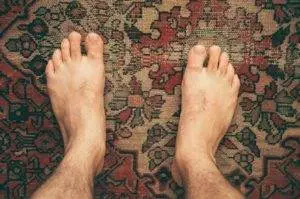
Sudden, intense pain and swelling in the big toe? Foot, ankle, knee, or elbow is red, hot, swollen and very painful? It may be a type of arthritis called gout that is caused by unusually high uric acid levels in the body. TCM methods have been used to effectively manage gout with acupuncture and herbs for thousands of years.
Gout, sometimes called gouty arthritis, is a kind of arthritis that develops over time due to other underlying conditions. When there is a sudden flare-up that creates a lot of pain and swelling in a joint, it is called an acute attack of gout. Gout is almost always related to a person’s diet and lifestyle, and part of any treatment plan is reducing intake of beverages and foods that cause gout.
Conventional treatment for gout involves first allowing the acute attack to subside, then using medications and monitoring to bring down high uric acid levels. Acupuncture and TCM have been shown in clinical studies to be even more effective at providing immediate gout pain relief and bringing down uric acid levels than typical drug therapies.
What Is Gout?
Gout is a very painful form of inflammatory arthritis caused by the buildup of uric acid crystals in a joint, often the big toe joint. Uric acid is formed as a byproduct of digestion; when the body breaks down purines–chemicals in certain foods–the resulting uric acid is processed by the kidneys and leaves the body in liquid waste. If too much uric acid is being produced, or if the kidneys are weak and unable to process it adequately, the level of uric acid in the bloodstream rises (hyperuricemia), and deposits of uric acid crystals begin to gather in the joints. These crystals have sharp edges, which are what cause the severe pain and swelling of a gout attack.
While older men are generally at higher risk for developing gout, gout can affect people of all ages and genders. Women are more likely to develop gout after menopause, when their uric acid levels tend to rise. People who are high risk for gout are those who already suffer from:
- Obesity
- Diabetes
- Heart failure
- High blood pressure
- Kidney disease
People who have a family history of gout, or who tend to eat a lot of meat and/or drink a lot of alcohol also face a higher risk for gout. Regular use of diuretics can precede attacks of gout.
The symptoms of gout can be very similar to those of other types of arthritis, but gout causes are different than those of rheumatoid arthritis. Thus is it important to seek help from your health care providers for diagnosing rheumatoid arthritis versus gout.
Top 5 Signs and Symptoms of Gout
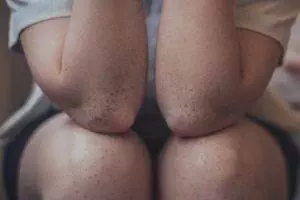
The underlying condition that causes gout is related to the kidneys, but the actual experience of gout is a form of acute inflammation, usually in one of the smaller joints of the limbs or extremities– most often there is gout in feet, especially the big toe joint. A person may have hyperuricemia for a long time, causing uric acid buildup in the body, but it doesn’t actually become “gout” until there is a flare-up of painful symptoms. The signs of a gout attack are:
- Intense pain in a joint (gout in big toe, gout in foot, gout in ankle, gout in hands, heel pain are all common)
- Redness
- Swelling
- Tenderness to even a slight touch
- Hot to the touch
Diagnostics for gouty arthritis include blood tests to check for uric acid levels, or extraction of fluids from the joint to check for uric acid crystals. Signs of gout in the joint may also show up in x-rays, or in an ultrasound or CT scan.
What is the Medical Treatment for Gout?
There are two components to conventional medical gout treatment: treatment for immediate gout pain relief, to reduce the pain and swelling of an acute attack of gout, and treatment to prevent a future gout attack by reducing the levels of uric acid in the blood.
For pain and swelling, most patients with gout are recommended NSAIDS for pain relief. People who cannot take NSAIDS due to stomach ulcers or kidney problems are often given corticosteroid injections in the affected joint. Many patients are also prescribed a drug called colchicine, which works by disrupting a specific inflammatory response in the body, which can help to reduce the formation of uric acid crystals. The rate of colchicine side effects such as nausea, vomiting, diarrhea, and stomach pain is fairly high.
To stabilize blood uric acid levels, there are medications that block the production of uric acid (Lopurin, Zyloprim, Uloric) and medications that break down and/or remove uric acid (Benemid, Zurampic, Krystexxa). These medications have to be carefully managed according to changes in uric acid formation and kidney function, as well as possible interactions with other medications. Many people who have gout also have heart problems or high blood pressure. This type of medical treatment for preventing and controlling gout often goes on for years, or even for the rest of a person’s life. Unfortunately, because it can be so difficult for both doctor and patient to keep up with monitoring, taking medication consistently, and changing dosages frequently, this sort of medical treatment often doesn’t work to prevent more gout attacks.
Can Acupuncture Help Gout?
TCM theory designates several internal pathogenic processes that can occur within the organ systems. TCM views gout as a problem of dampness and heat, and/or stagnation and buildup of phlegm in the joints. As we mentioned earlier, many, if not most, people who suffer from gout also have other health problems like hypertension or diabetes. So, the TCM provider is also looking at the root causes of those health issues and will treat those with acupuncture and herbs at the same time. The goal of acupuncture and herb supplementation is always to bring the all of the organ systems back into harmony. TCM herbs to help gout will work to strengthen the spleen, kidneys, and liver, clear heat and dampness, and improve blood circulation.
A systematic review of studies relating to TCM treatment of gout with acupuncture showed that patients receiving acupuncture and herbs fared better overall than those in the control group being given typical medical therapy. The studies measured the “resolution” of an attack of gout; meaning, whether or not the pain and swelling was completely reduced within a 24-hour period. They also measured the reduction of uric acid levels in the blood before and after treatment. According to both measures, patients who received TCM treatment for gout had better results than those taking western medicines like colchicine or allopurinol.
A controlled clinical trial conducted at a research hospital showed a 92.5% efficacy rate for treating an acute gout attack, versus an 82.5% efficacy rate for patients who were given NSAIDS to treat the pain.
Top 5 Home Remedies for Gout According to TCM

First and foremost, it is necessary to plan and follow through on an appropriate gout diet: knowing what foods to avoid with gout is vital to prevent future attacks.
- Avoid Foods that cause Gout – foods that are high in purines include red meat, organ meats, seafood and alcoholic beverages, including beer, wine, and liquors. Risk for gout rises dramatically when people drink 2-4 or more alcoholic beverages per day. This may be because the body has to prioritize processing the alcohol over removing uric acid.
- Avoid sugar – Especially sugary drinks like sodas, and sweetened juices. Fructose appears to be particularly linked to higher incidence of gout, so read labels and avoid products sweetened with fructose or high fructose corn syrup.
- Avoid refined flours and yeast – the combination of yeast, white flour, and white sugar does not provide much nutritional value, and can raise uric acid levels.
- Emphasize whole, natural foods – all fruits, vegetables, and legumes are safe to eat with gout. Eggs and low-fat dairy products are safe sources of protein.
- Drink more water – this helps your body to more effectively flush out excess uric acid.
Exercising more and working on healthy, gradual weight loss will also help to prevent future gout attacks. Your acupuncturist can help you to develop a specific gout diet that will work for your constitution.
Acupuncture Near Me for Gout
While treating gout can be tricky due to the fact that it is usually not the only health issue that needs attention, the good news is that gout is one of the few types of arthritis that can be reversed. A holistic approach that takes into consideration a person’s diet, lifestyle, and other health problems is the best way to keep the intense pain of gout at bay. Acupuncture and TCM offer a solid alternative treatment method that can relieve gout and improve your overall health, all without unwanted side effects.
*This article is for education from the perspective of Traditional Chinese Medicine only. The education provided by this article is not approved by FDA to diagnose, prevent, treat and cure human diseases. It should not stop you from consulting with your physician for your medical conditions. Traditional Chinese Medicine is based on Qi, which is an invisible force that usually cannot be observed by modern science. Because science focuses on testing ideas about the natural world with evidence obtained through observation, these aspects of acupuncture can’t be studied by science. Therefore acupuncture and Chinese herbs are often not supported by double-blind, randomized trials, and they are considered alternative medicine therapies in the United States.
How to Treat Aging Skin With Cosmetic Acupuncture
By Xiaomei Cai, L.Ac., Ph.D. & Qineng Tan, L.Ac., Ph.D.
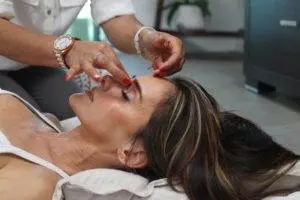
Looking for a treatment that can help smooth fine wrinkles, boost collagen and firm skin? Maybe you’ve heard about cosmetic acupuncture, also known as facial rejuvenation, or an acupuncture face lift, and you’re wondering if it really works. TCM and acupuncture offer a natural, health-centered skin care alternative to surgery and other procedures for people of all ages who want to look younger and more well-rested.
We all want to look in the mirror and see ourselves looking our best. Cosmetic procedures like plastic surgery and minimally-invasive aesthetic treatments have increased by well over 200% in the past twenty years. People of all genders and ages are showing more interest than ever in anti-aging treatments that can tighten, tone, and brighten the skin, banish puffiness and dark circles under the eyes, clear acne blemishes and scars, and reduce the appearance of wrinkles. While advances are continually being made in the field of aesthetic medicine, and the stigma surrounding such treatments has been largely reduced, some of these procedures can be harsh and invasive. Many people may prefer to seek a natural alternative.
The TCM approach to skin care is holistic and health-oriented, focusing on creating healthy, lively skin from the inside out. Finding the root internal causes of dull, sagging skin, lack of muscle tone, dryness and other skin problems, and treating them with targeted acupuncture points, herbs used both topically and internally, and the right nutrition program, can all lead to a more youthful and invigorated appearance. The results, of course, will not change your face so dramatically that you look like a different person. It is important that any time you consider an aesthetic procedure, you manage and maintain realistic expectations. But cosmetic acupuncture treatment can help you to feel better about yourself, inside and out.
What Is an Acupuncture Face Lift?
Cosmetic acupuncture, while seeking to improve the overall appearance of the face and neck, is really based in optimizing the patient’s health throughout the body. Acupuncture needling works on several levels. Usually, we explain how stimulating points with acupuncture affects Qi (life force energy) as it flows through the meridian pathways of the body, producing changes in the function of the organ systems. But it also works on the skin-deep level, creating micro-trauma to the skin and underlying tissues that triggers repair and rebuilding. If you have had acupuncture before, you might have felt your acupuncturist gently turn the needles after inserting them. Research has shown how this age-old technique actually does produce a direct effect on collagen fibers. This is partly why acupuncture treatment helps you heal from musculoskeletal injuries and chronic pain conditions. It also helps your skin heal and regenerate.
Acupuncture is also proven to aid in the release of endorphins, which help you feel happier and more relaxed. We all know that a positive outlook can do wonders for your looks. Acupuncture treatment not only gives you the appearance of being well-rested; it actually helps you sleep better and relieves stress that can cause frowning and worry lines.
Your practitioner will choose specific acupoints to target your individual needs, addressing other skin concerns in addition to the signs of aging, including acne and rosacea.
Often, people notice a difference in their appearance right away, as even one treatment can help the skin take on a new glow, and most people emerge from their acupuncture session feeling that they have had a good rest. Generally, we recommend that, in order to see noticeable results, you start with 1-2 treatments per week for at least a few weeks, then continue with a monthly treatment to maintain the results.
A scientific study used topographic imaging to measure the contours of patient’s faces as they underwent a course of five cosmetic acupuncture treatments. The researchers concluded, based on the images and patients’ self-assessments, that facial cosmetic acupuncture produced significant improvement in skin elasticity.
A systematic review of TCM cosmetic acupuncture study data showed that patients reported positive results, including: fewer wrinkles and better skin condition, with improved moisture content.
Cosmetic Acupuncture Vs. Botox
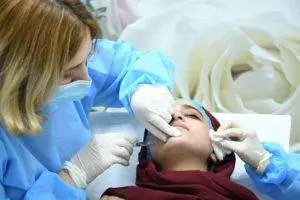
In recent years, Botox injections have become an extremely popular and acceptable way to combat the primary “problem” of aging skin: wrinkles. Facial skin is creased every time we move the facial muscles to express ourselves. Over time, as skin loses its elasticity, these creases become deeper and more defined. Botox (short for botulinum toxin) is a paralytic agent, which means it temporarily “freezes” or paralyses the muscles that lie under the skin of the face, so that they will not move when a person frowns or smiles. This helps prevent the formation of deeper lines between the eyebrows, for example, or along the nasal-labial folds on either side of the mouth.
While Botox injections are widely considered safe these days, there are risks involved with treatment. Minor short term side effects can include redness, swelling, headaches, or nausea. In some instances, the muscle paralysing action can spread to more necessary parts of the facial musculature, causing speech problems, trouble swallowing, or trouble breathing. It can also cause parts of the face to droop due to muscle weakness. While many people have experienced satisfaction with wrinkle reduction due to Botox treatment, we have probably all noticed cases in which a person ends up looking unnaturally startled, lop-sided, or simply incapable of normal expression.
The effects of Botox are temporary, and in order to maintain the smoother skin, people must return for more injections every few months. Facial acupuncture, too, should be performed regularly to maintain results, but TCM offers a more comprehensive approach to smoothing and preventing wrinkles by boosting collagen production and circulation, improving skin elasticity. Massage techniques such as Gua Sha can firm and tone the facial muscles so that the whole face still moves naturally. Botox injections don’t do anything to improve the health of your skin or light up your eyes from within. Facial rejuvenation with TCM is essentially a risk-free procedure that can provide natural-looking results.
The TCM Approach to Skin Care

One of the subtler techniques used by TCM practitioners is that of examining a patient’s physiognomy; that is, deducing problems of physical, emotional, and spiritual health by “reading” a person’s face. We can also tell a lot about a person’s internal condition by studying the skin and nails on their hands. This is an art that the acupuncturist can only master with many years of experience.
For example, if there is a tendency to develop dark circles or bags under the eyes and bruise easily, this indicates a stagnation of blood circulation. That deep crease or “frown line” between the eyebrows may indicate a Liver Qi stagnation. The acupuncturist will choose points to stimulate based on each individual’s constitution, working on deeper levels of stagnation in the organ systems, while also targeting specific muscles in the face and neck that need toning.
Naturally, we also use herbs to help nourish the skin. Traditionally, poultices or face masks have been used to directly bring nutrients to the facial skin, while internal herbs taken as teas help to clear heat and dampness from the body. Your TCM provider may also use cupping to draw out toxins and stimulate the lymphatic system; basically, this is like a deep cleaning for your whole body.
Top 5 Tips for Natural Skin Care

We cannot emphasize enough that glowing skin starts within. You may already have a daily skin care routine that involves cleansers and moisturizers, but for the best results, be sure to focus equally on keeping the whole body hydrated, cool, and free of toxins. No matter what age you are right now, you can start making your skin a priority with these simple practices:
- Drink water and green tea – plenty of water keeps the skin cells “plump.” Green tea has been used for centuries to help maintain clear, hydrated skin.
- Get plenty of sleep – There is solid reasoning behind the expression “I need my beauty sleep.” Our cells regenerate and repair themselves while we sleep; this is when the collagen production happens, so give your body plenty of time to do its work.
- Eat the right foods – for healthy skin, make sure to take in enough Omega 3 fatty acids (found in fish oil, good quality eggs, and fresh walnuts), and eat more cooling foods. These include: melon, cucumbers, citrus fruits, cabbage, seaweed, and other greens, mung beans, and soy foods like tofu and tempeh.
- Reduce stress – Stress negatively impacts your skin in a number of ways. Stress can contribute to acne, bags under your eyes, rashes, worry and frown lines, and dryness. Make stress reduction a top priority to improve the overall health of your skin.
- Sun Protection – Getting a little sun (about 30 minutes of exposure) every day is important for the proper functioning of your immune system, but too much sun can be damaging to the skin. Whenever possible, protect your skin with light garments and a hat; this is preferable to the constant use of cosmetic sunscreens, most of which contain potentially toxic chemicals. When you must expose more skin to the sun’s rays, use a sunscreen with natural ingredients.
Cosmetic Acupuncture Near Me
If you’ve been thinking about what sort of medical aesthetic treatments might be right for you, try cosmetic acupuncture for a more youthful look without any side effects or recovery time. There really is no down side to an acupuncture face lift; in fact, your acupuncturist can treat all of your health concerns–back pain, headache, menopause, etc.–,and add the needles for facial rejuvenation all in the same treatment session. Maybe it’s time to give yourself the gift of a little lift with cosmetic acupuncture.
*This article is for education from the perspective of Traditional Chinese Medicine only. The education provided by this article is not approved by FDA to diagnose, prevent, treat and cure human diseases. It should not stop you from consulting with your physician for your medical conditions. Traditional Chinese Medicine is based on Qi, which is an invisible force that usually cannot be observed by modern science. Because science focuses on testing ideas about the natural world with evidence obtained through observation, these aspects of acupuncture can’t be studied by science. Therefore acupuncture and Chinese herbs are often not supported by double-blind, randomized trials, and they are considered alternative medicine therapies in the United States.
How to Help Stroke Recovery With Acupuncture and TCM
By Qineng Tan, L.Ac, Ph.D. & Xiaomei Cai, L.Ac., Ph.D.
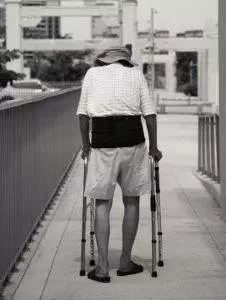
Can acupuncture help stroke recovery? After even a mild stroke, people will often have many problems: weakness in parts of the body, pain or tingling in hands, arms or legs, lack of awareness (or neglect) of parts of the body, memory loss, and slurred speech. There can also be emotional and mental health issues after a stroke, like depression, anxiety, or anger. Stroke recovery acupuncture can have a positive impact on balance, coordination, and overall sense of wellbeing.
A stroke is a medical emergency event that occurs when the flow of blood to some part of the brain is blocked, starving that part of the brain of the oxygen and nutrients it needs to function. Sometimes this happens because of a burst blood vessel (hemorrhagic stroke), or a blood clot (ischemic stroke) creating the blockage. A “mini stroke,” or transient ischemic attack, is when blood flow is only compromised for a few minutes, and then the situation improves. Without adequate blood flow, brain cells deteriorate and die very quickly. Any type of stroke is very dangerous to a person’s health and requires immediate medical care. Even in the case of a mini stroke, or mild stroke, a person must seek care to check for damage and to help prevent a stroke from occurring again.
Strokes are one of the leading causes of death and disability worldwide. Many people who suffer a stroke end up losing some of their physical and mental faculties, sometimes experiencing seizures. How a person goes through the recovery process after a stroke can make a huge difference in the ultimate outcome. Typical post-stroke treatment includes physical therapy to help people regain motor function.
The human brain is actually amazingly able to regenerate itself, given the appropriate nourishment and circumstances. With good nutrition and the right exercise, blood vessels will rebuild themselves, and new neurons (specialized brain cells) will be created. It is vital, though, that the flow of nutrient-rich blood to the brain is maximized, and that a person is motivated and able to work through the difficulties of retraining the brain and body to function.
This is where TCM and acupuncture come in. Acupuncture treatment works to enhance the flow of Qi and blood to blocked areas of the body, while TCM herbs are carefully chosen to provide nutrients people may not be able to get from foods. Acupuncture helps reestablish connections in the nervous system, and stimulates muscle and organ tissues to aid in healing after stroke.
How To Tell If You’re Having a Stroke
“Am I having a stroke?” It’s important to review the signs of a stroke, so that if you or someone close to you could be having a stroke, you can act quickly to get help. If you are having a stroke, seeking immediate medical attention is crucial. A stroke causes damage to brain cells, so every moment is critical when it comes to surviving a stroke and maintaining functional abilities.
“FAST stroke” is the first way to tell if someone is having a stroke; start by remembering the acronym FAST for stroke test:
- F – Face drooping, often on one side, mouth especially looks lopsided
- A – Arm weakness, usually on one side, person cannot lift arm, or it feels numb
- S – Speech difficulty – speech is slurred, or the person is unable to speak or has trouble forming thoughts into words (aphasia)
- T – Time to call 911. If a person shows the signs of stroke, they need medical attention right away. Get them to the emergency room as quickly as possible.
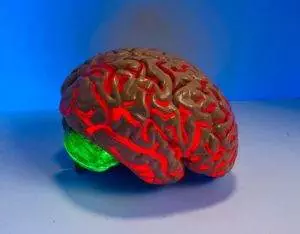
Depending on where in the brain the stroke has occurred, symptoms will vary somewhat. A stroke that occurs in the right hemisphere in the brain will cause weakness and numbness on the left side of the body. It may also affect a person’s ability to recognize what is going on with the weakened parts of the body; this is what we call “neglect.” Visual and/or spatial impairment are common signs of right side stroke; it may be hard to see or find things.
Strokes on the left side of the brain cause weakness on the right side of the body, and may also impair vision and/or the ability to orient oneself in space. The ability to reason, read, and perform mathematical calculations may be impaired. Left side stroke is more likely to cause feelings of depression and change a person’s personality so that they become more anxious and hesitant.
Once a person has been gotten to medical help, health care providers use the NIH stroke scale to assess how severe the stroke is. In some cases the use of anti-clotting medications will restore blood flow to the affected area. This works best if the patient can be given this medication within three hours of the beginning of the stroke. Other times, a procedure called a thrombectomy may need to be performed, in which a surgeon will remove the clot with a thin catheter instrument. In the case of a hemorrhagic stroke, patients may require surgery or a blood transfusion to manage bleeding in the brain.
Can Acupuncture Help Prevent Stroke?

A stroke occurs in the brain, but from the TCM perspective, the problem doesn’t begin or end in the head. A stroke is the result of disruption of the normal flow of blood and Qi in the body, and some type of inciting event causing the blood to rush suddenly upwards into the head. A stroke is often the result of conditions in the body that have developed over time, but then too much stress or an emotional upheaval causes the immediate emergency event of a stroke.
Western medicine views high blood pressure as one of the main factors that can lead to stroke. So, while an acupuncturist also views stroke as being related to problems with the movement of blood, we have concepts that explain what problems within the body are causing the impeding of proper flow. According to TCM, stroke happens due to internal factors of deficiency, stagnation, fire/heat, phlegm and wind:
- Yin Deficiency – especially affecting the liver and kidney systems. This happens often due to behaviors like staying up late, not getting enough sleep, and eating more heat-producing foods.
- Heat – strong emotions of anger and frustration, due to stress and conflict, can contribute to a build up of too much hot energy in the body, especially impacting the heart and liver.
- Phlegm – another internal factor, the formation of phlegm in the body can happen due to unhealthy eating habits. The build up of phlegm particularly affects the spleen and contributes to post-stroke problems with speech, numbness in the limbs, and mental fog.
- Stagnation – this refers to blood and/or Qi being stuck, unable to flow freely through the vessels and meridians. Acupuncture treatment and exercise can help get Qi and blood moving again.
- Wind – In TCM, Wind is a pathogenic factor that can enter the body from the outside environment (external), or wind can be an internal factor, generated within the body. In the case of stroke, internal wind is considered to be the cause of a person losing their conscious awareness of their body and becoming mentally disconnected and/or physically paralysed.
Cupping may be used in addition to acupuncture to aid stroke recovery. Cupping increases blood flow and may be helpful in particular for one of the lesser known symptoms following a stroke: persistent hiccups.
Stroke Rehabilitation Acupuncture Near Me
Your acupuncture and TCM provider has lots of tools at his or her disposal to help you manage your health and longevity. If you have diabetes, high blood pressure, or a history of heart problems, your risk for having a stroke is higher. Your acupuncturist can help you manage these conditions and provide counseling so that you can make the optimal lifestyle changes to prevent stroke. If you have suffered a stroke, you will need lots of support and may need a fairly rigorous course of therapy to help you regain your strength and ability. Patients who are recovering from a stroke should ideally receive 2-3 acupuncture treatments per week in order to get the most benefit. Integrative care may be the key to making the fullest recovery possible after a stroke.
*This article is for education from the perspective of Traditional Chinese Medicine only. The education provided by this article is not approved by FDA to diagnose, prevent, treat and cure human diseases. It should not stop you from consulting with your physician for your medical conditions. Traditional Chinese Medicine is based on Qi, which is an invisible force that usually cannot be observed by modern science. Because science focuses on testing ideas about the natural world with evidence obtained through observation, these aspects of acupuncture can’t be studied by science. Therefore acupuncture and Chinese herbs are often not supported by double-blind, randomized trials, and they are considered alternative medicine therapies in the United States.
How to Treat High Blood Pressure With Acupuncture & TCM
By Qineng Tan, L.Ac., Ph.D. & Xiaomei Cai, L.Ac., Ph.D.
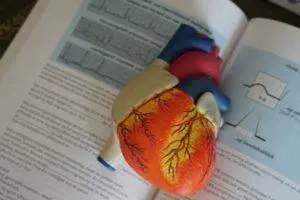
What is high blood pressure? Blood pressure (BP) is the force with which blood, pumped by the heart, pushes against the inner walls of the arteries and veins. When this force is consistently high, it puts a strain on the delicate tissues of the blood vessels and makes your heart work harder. This is also called hypertension. Most people take medications to control high blood pressure. In this article we’ll discuss how to manage high blood pressure with TCM and acupuncture.
High blood pressure is very common in older adults; about half of people over the age of 60 have high blood pressure. It is very important to have your doctor regularly monitor your blood pressure, because high blood pressure, if left untreated, can lead to heart disease, arrhythmia, heart attack, stroke, kidney disease, and many other serious, life-threatening conditions.
Your blood pressure reading is made up of two parts: systolic, which measures the force of blood being pumped away from the heart, and diastolic, the force of blood moving in between heart beats, when blood is flowing back into the heart. A normal blood pressure reading is usually considered 120/80 (systolic over diastolic). A consistent reading of BP over 130 would indicate hypertension stage 1, while a BP over 140 would be classified as hypertension stage 2. A BP over 180 signals a hypertensive crisis, and should be treated as an emergency, as it could lead to a stroke or other serious organ failure.
People with high blood pressure are advised to make lifestyle changes, including following a healthier diet, getting more exercise, and quitting smoking. Even a modest weight loss of ten pounds or so can make a big difference to reduce high blood pressure. Most people end up taking antihypertensive medications to lower blood pressure, often for the rest of their lives. Integrative care for high blood pressure that includes acupuncture treatment and herbal supplements according to TCM principles can provide natural remedies for high blood pressure, restoring the health of the circulatory system so that it might not be necessary to take drugs indefinitely.
Signs of High Blood Pressure
In many cases, there are no clear signs that a person has high blood pressure. Most people do not realize they have high blood pressure until it is measured by a medical professional. While people may think that a flushed, red face, or bouts of dizziness are symptoms of high blood pressure, these sorts of signals are not necessarily directly caused by high blood pressure. A flushed face caused by dilated blood vessels can happen for many reasons, usually because of a temporary rise in blood pressure due to heat, or cold weather, physical activity, spicy foods, hot drinks or alcohol, or a reaction to cosmetic skin products. Dizziness can actually be related to the side effects of medications prescribed for high blood pressure. The only way to know for sure is to check your blood pressure.
Many older people, especially women, with high blood pressure, experience bouts of dizziness that may be part of a hypertensive crisis – a sudden increase in blood pressure that can cause temporary dizziness or vertigo, tinnitus (ringing in the ears), or headache. A hypertensive emergency is sometimes the reason that a person visits a doctor to have a blood pressure check. It may be that hypertension has an effect on the peripheral auditory and vestibular systems, which can affect a person’s sense of equilibrium and orientation in space. High blood pressure can also contribute to problems with memory or cognitive function.
Top 10 Causes of High Blood Pressure
Many factors can lead to high blood pressure. Aging is one factor. If there is a family history of hypertension, you may be genetically predisposed to having high blood pressure, too. Other risk factors also increase the chances of high blood pressure:
- Smoking
- Diet high in salt and/or fat
- Lack of exercise, sedentary lifestyle
- Being overweight
- Stress
- Too much alcohol consumption
- Sleep apnea, snoring
- Thyroid and adrenal problems
- Kidney problems
- Diabetes
Medical diagnosis and treatment for high blood pressure don’t really focus on finding a root cause of the problem. General guidelines for eating less salt and fat, losing weight, and finding ways to reduce stress may help people reduce high blood pressure, but for most people, modest lifestyle modifications aren’t enough to solve the problem.
High Blood Pressure During Pregnancy
Some women develop high blood pressure during pregnancy. Called gestational hypertension, this occurs when a woman has elevated blood pressure during the last 20 weeks of pregnancy. While this type of high blood pressure usually goes away after birth, it can be an indicator of becoming hypertensive later in life. In some cases, having high blood pressure while pregnant can cause problems, such as fetal growth restriction, which may happen if not enough nutrients are being carried to the growing fetus through the blood vessels. If high blood pressure and high levels of protein in the urine are both detected, a woman may have preeclampsia, a serious problem that is believed to be caused by restricted blood flow to the placenta. Women with high blood pressure during pregnancy are more likely to experience preterm birth and to have unplanned delivery Caesarean section.
Conventional treatment for gestational hypertension typically involves monitoring and managing high blood pressure with medications. While not many clinical studies have been done regarding acupuncture treatment for gestational hypertension and preeclampsia, TCM has been used to treat high blood pressure and complications of pregnancy for thousands of years. From the TCM point of view, high blood pressure during pregnancy may be due to a deficiency of Liver and/or Kidney Yin, or rising Liver Yang energy in response to a Kidney Yin Deficiency, or Blood or Yin Deficiency. A TCM provider would use diagnostic methods to determine the differentiation and use acupuncture points to nourish the appropriate organs, promote better flow of Blood and Qi, and to help alleviate stress.
How to Control Blood Pressure with Acupuncture and TCM
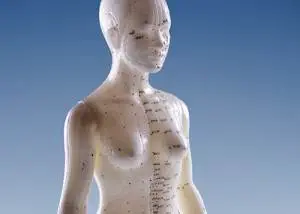
Naturally, for many centuries, TCM practitioners had no way of measuring blood pressure with medical devices. They depended on observations of people’s symptoms, appearance, and careful checking of the pulse by hand. Thus, TCM does take into consideration the patient’s feelings and experience of symptoms of high blood pressure like:
- Dizziness or vertigo
- Palpitations
- Headache
- Fatigue
- Shortness of breath
- Weakness in the knees
- Memory loss
- Vision loss
TCM views dizziness as being a result of too much Liver Yang energy, stagnant Phlegm, Liver-Kidney deficiency, and deficiency or stagnation of Blood and Qi. Hypertension type headaches are caused by the addition of Fire energy coming from the stomach or intestine. Liver Fire can cause irritability and flushing in the face, while Heart Fire can cause chest distress, nervousness, and insomnia. Weakness and fatigue would be caused by the addition of Dampness and accumulated excess fluid. Fluid retention can lead to a distended abdomen, edema, and low back pain.
TCM philosophy also takes into consideration the emotional state as it relates to the physical health of the body. More recent scientific research also confirms that feelings of anger stimulate the sympathetic nervous system and contribute to high blood pressure and heart disease. Finding practices that help how to control anger and find calm are another important part of managing high blood pressure.
A TCM practitioner can treat all of these various symptoms with a combination of acupuncture treatment and herbal supplements individually customized for each patient’s specific circumstance.
One randomized study compared patients receiving acupuncture versus patients receiving sham acupuncture to treat hypertension over a six-week period. The patients who had real treatments showed significantly lower daytime and nighttime blood pressure readings. Another study showed that acupuncture treatment given to patients in conjunction with antihypertensive medications showed significant reduction in both systolic and diastolic BP readings.
As the results of this research study of many clinical trials concluded, regular acupuncture treatments have the effect of reducing blood pressure, with the effects lasting several days after each treatment. Acupuncture treatment generally has a cumulative effect, and it is necessary to stick with it to get results. It is also crucial that you work with your healthcare practitioner to determine which dietary changes and forms of exercise will best help how to reduce high blood pressure.
Acupuncture Near Me for High Blood Pressure
Managing high blood pressure takes commitment to making long-term lifestyle changes and regular monitoring. Adding acupuncture and TCM to your integrative care regimen may help you reduce high blood pressure, improve related problems like fatigue, dizziness, and headache, and avoid more serious health problems down the line.
*This article is for education from the perspective of Traditional Chinese Medicine only. The education provided by this article is not approved by FDA to diagnose, prevent, treat and cure human diseases. It should not stop you from consulting with your physician for your medical conditions. Traditional Chinese Medicine is based on Qi, which is an invisible force that usually cannot be observed by modern science. Because science focuses on testing ideas about the natural world with evidence obtained through observation, these aspects of acupuncture can’t be studied by science. Therefore acupuncture and Chinese herbs are often not supported by double-blind, randomized trials, and they are considered alternative medicine therapies in the United States.